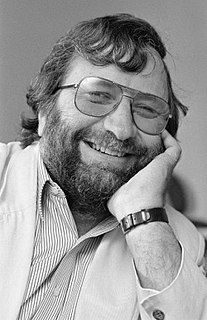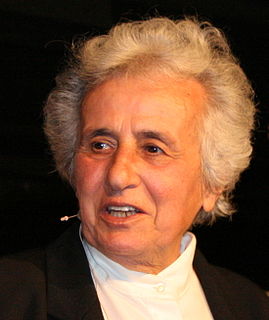A Quote by Elliott Abrams
If you are trying to raise a child to be a Jew, then you have to create a sense of Jewish identity. You really weaken that sense of identity if you celebrate two religions.
Related Quotes
All over the world today people have a very strong desire to find a sense of identity, and at the same time that's coupled with the rise of absolutely absurd wars that relate to ethnic identity. Perhaps there is something deeply ingrained in people that relates to a sense of belonging, and without that, identity doesn't seem as real as it should.
If a man has a sense of identity that does not depend on being shored up by someone else, it cannot be eroded by someone else. If a woman has a sense of identity that does not depend on finding that identity in someone else, she cannot lose her identity in someone else. And so we return to the central fact: it is necessary to be.
If you embrace a project that will require time and patience, then you need something to work on. So the first step of the project is to create an identity. If you don't have an identity, then today you want this player and tomorrow another one. If you have an idea and a shape, then this is how you develop an identity.
What the Clintons have always done is embraced challenging. They can't have enough photo opportunities with Al Sharpton or Jesse Jackson. They communicate to blacks that they agree with their challenging identity. So, in a sense, Hillary is blacker than Barack Obama. Their alignment with this black identity makes them 'black' in a metaphorical sense, I guess.
The identity of just one thing, the "clash of civilization" view that you're a Muslim or a Hindu or a Buddhist or a Christian, I think that's such a limited way of seeing humanity, and schools have the opportunity to bring out the fact that we have hundreds of identities. We have our national identity. We have our cultural identity, linguistic identity, religious identity. Yes, cultural identity, professional identity, all kinds of ways.
In school they told me I was a Jew, "a filthy Jew." At first I asked myself what exactly that was. But then I began to understand. I was a Jew, I was a member of the Jewish faith, the Jewish community. One time, when I was giving a reading at a school, someone asked me: "If it was so dangerous to be Jewish, why didn't you convert to Christianity?" My response was: "It's not as easy you think. When you're a Jew, you're a Jew.
When you continuously know and sense yourself as the space of consciousness rather than what appears in consciousness - sense perceptions, thoughts, emotions - then it can be said that you are enlightened... except that you wouldn't think or speak of yourself as 'enlightened', because that would instantly create another mind-based conceptual identity and so it would be the end of 'your' enlightenment.
When it comes to identity, that was an issue that plagued me for a lot of my life. It's something that I wanted to tap into. Film can really take you to other places, and sometimes that's necessary to understand your own identity or someone else's identity or just the issue of identity, in general. It takes you. It's borderless. It's boundless. It's universal.
I definitely have a strong sense of my Jewish and Israeli identity. I did my two year military service, I was brought up in a very Jewish, Israeli family environment, so of course my heritage is very important to me. I want people to have a good impression of Israel. I don't feel like I'm an ambassador for my country, but I do talk about Israel a lot - I enjoy telling people about where I come from and my religion.


































